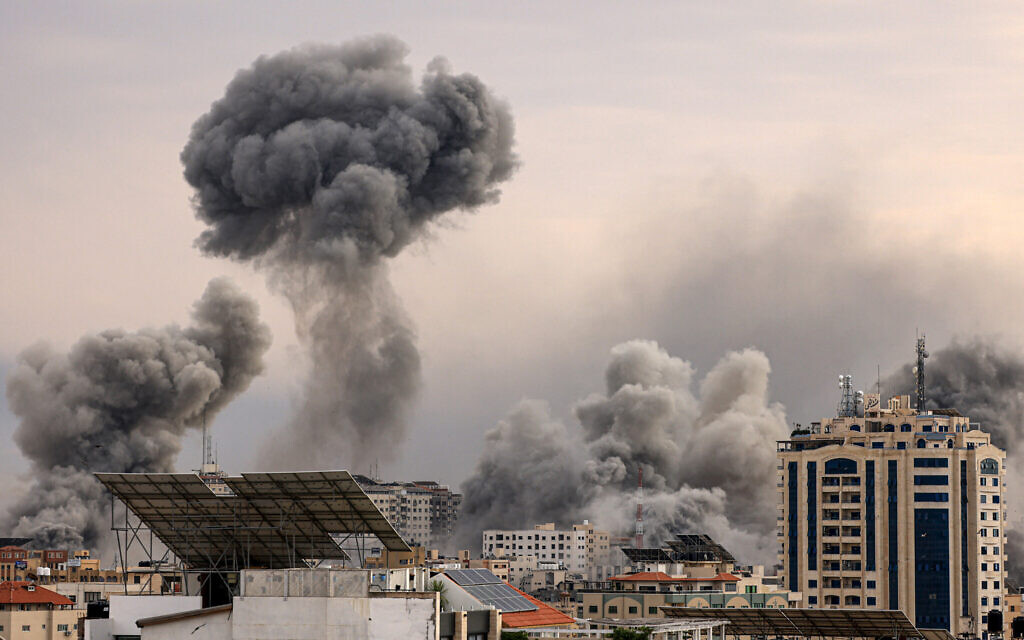Tragedy Unfolds in the Midst of Conflict: 13 Hostages Killed in Israeli Air Strikes, Hamas Claims

Tragedy Unfolds in the Midst of Conflict: 13 Hostages Killed in Israeli Air Strikes, Hamas Claims
In the turbulent heart of the Israeli-Palestinian conflict, tragedy has once again struck, leaving 13 hostages dead in the wake of Israeli air strikes within the northern Gaza Strip. The militant group Hamas, which controls the Gaza Strip, has asserted that Israeli military actions have led to the loss of these lives. Israel, in turn, contends that Hamas has taken 150 individuals, including civilians and security personnel, as hostages in the aftermath of an attack on the country that unfolded on a fateful Saturday.
As we delve into this unfolding crisis, it is imperative to grasp the complexities of the Israeli-Palestinian conflict, the role of Hamas in the region, the nature of hostage situations, and the consequences of military operations on both sides. This tragedy casts a grim shadow over the already strained relations in the region, while the world watches with growing concern.
The Israeli-Palestinian Conflict: A Never-Ending Struggle
The Israeli-Palestinian conflict is an enduring and deeply rooted struggle that dates back decades. At its core, this conflict revolves around competing national identities and territorial claims. It encompasses numerous aspects, such as the status of Jerusalem, the establishment of an independent Palestinian state, and the right of return for Palestinian refugees. This multifaceted dispute has led to recurring episodes of violence, diplomatic impasses, and human suffering.
The Gaza Strip, a narrow piece of land along the Mediterranean coast, has become a focal point in this conflict. Home to around two million Palestinians, the Gaza Strip has been under the control of Hamas since 2007, following a brief but brutal internal conflict. Hamas is considered a terrorist organization by Israel, the United States, and the European Union, further complicating the situation.

The Latest Chapter: Israeli Air Strikes and Hostages
The recent series of events that have transpired in the Gaza Strip began with an attack on Israel, an assault that Israel claims was initiated by Hamas. The Israeli military argues that Hamas launched a barrage of rockets and initiated an attack, which led to a swift and forceful response. This response included air strikes on targets within the Gaza Strip, which is a well-documented military tactic used to eliminate threats and facilities associated with Hamas.
It is within the context of these air strikes that the issue of hostages emerged. According to Hamas, at least 13 hostages, including foreigners, have been killed during these Israeli military operations. The situation is grave, and reports of casualties have left many deeply concerned.
However, Israel disputes this claim and argues that it was Hamas who took hostages, numbering as many as 150 individuals. This purported hostage situation raises many questions regarding the nature of these hostages and the implications of such an act during an armed conflict.
Hostage Situations in Conflict Zones: A Complex Issue
Hostage situations in conflict zones are profoundly troubling, as they introduce a layer of complexity to already volatile situations. In such scenarios, individuals are forcibly detained or held against their will by one of the involved parties, often with the aim of exerting pressure or advancing specific objectives. The captives can range from combatants to civilians, and their fate often remains uncertain, hanging in the balance of the conflict.
It is essential to recognize that hostage situations are fraught with moral, ethical, and legal dilemmas. International law, specifically the Geneva Conventions, prohibits hostage-taking, emphasizing the protection of civilians in times of armed conflict. Violations of these principles can lead to serious consequences and international condemnation.

However, in the chaos of conflict, distinguishing between combatants and non-combatants can be exceptionally challenging. Hostages are often used as bargaining chips or to dissuade enemy actions, and their release can become a crucial demand in negotiations between warring parties.
The veracity of claims by both Hamas and Israel regarding hostages in the Gaza Strip is yet to be independently confirmed, and the circumstances surrounding these individuals remain uncertain. Clarifying these events is vital to understanding the complete picture of the situation.
Consequences of Military Operations: A Grim Reality
The use of military force in conflicts such as the Israeli-Palestinian dispute inevitably results in casualties and loss of life. Air strikes, while a powerful tool for a military seeking to eliminate threats, are not without consequences. Collateral damage, which encompasses harm to civilians and non-combatants, is a painful and recurring aspect of modern warfare.
In the case of the Gaza Strip, densely populated with civilians, the risk of collateral damage is high. The tragic loss of 13 hostages, as claimed by Hamas, highlights the devastating impact of military operations on innocent lives. However, the extent of this impact remains subject to investigation.
On the other hand, Israel argues that Hamas’s actions, including rocket attacks and the alleged taking of hostages, prompted the military response. This raises questions about the proportionality and legality of Israel’s actions in response to the initial attack. International humanitarian law requires parties involved in a conflict to use proportional force and avoid targeting civilians.
The situation in the Gaza Strip underscores the broader issue of how military strategies, responses, and their consequences are perceived and scrutinized by the international community. The tragic loss of innocent lives, whether due to rocket attacks or air strikes, underscores the urgency of finding a peaceful and lasting resolution to this enduring conflict.
The Call for International Intervention and Peace
The latest events in the Israeli-Palestinian conflict underscore the pressing need for international intervention and a renewed push for peace. The suffering of civilians on both sides, the loss of innocent lives, and the destabilizing impact on the region as a whole underscore the urgent need for a resolution to the conflict.
Efforts to resolve the Israeli-Palestinian conflict have a long history, with various diplomatic initiatives, peace talks, and negotiations taking place over the years. Yet, the situation remains fraught with complexity and deeply rooted grievances. This recent escalation only underscores the fragility of the status quo and the dire need for a comprehensive, equitable, and lasting solution.
As the international community watches with growing concern, diplomatic efforts must be redoubled. The tragic loss of lives, whether due to rocket attacks, air strikes, or alleged hostage situations, demands a commitment to finding a path to peace. This commitment should extend to all parties involved, as well as international stakeholders, in order to end the cycle of violence and suffering.

Conclusion
The recent events in the Gaza Strip have brought to light the tragic loss of lives in the midst of the Israeli-Palestinian conflict. The claims by Hamas and Israel regarding hostages and the consequences of military operations underscore the complexity and dire consequences of the ongoing dispute. International intervention and a renewed commitment to peace are now more critical than ever, as the world watches with deep concern, hoping for a resolution that can bring an end to this enduring conflict.






